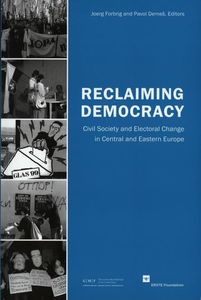Meladze, Giorgi და Krastev, Ivan (2011) Reclaiming Democracy: Civil Society and Electoral Change in Central and Eastern Europe, Chapter: Enough! KMARA and the Rose Revolution in Georgia. In: Reclaiming Democracy: Civil Society and Electoral Change in Central and Eastern Europe. German Marshall Fund/ERSTE Foundation.
![[img]](http://eprints.iliauni.edu.ge/1904/1.hassmallThumbnailVersion/show_preview.jpg)
|
გამოსახულება (Reclaiming Democracy: Civil Society and Electoral Change in Central and Eastern Europe, Chapter: Enough! KMARA and the Rose Revolution in Georgia)
show_preview.jpg - გამოქვეყნებული ვერსია Download (30kB) | გადახედვა |
რეზიუმე
The recent surge of democratic movements in the Arab World, including the January 25th protests that topled Egyptian President Hosni Mubarak's regime, opens new windows on the world of civil society and its role in asserting democracy. While these movements raise new questions for scholars of democratic movements and activists alike, they also share an inspiration in the democratic breakthroughs in Central and Eastern Europe that preceded them. Inspired by those who shaped the Arab Spring, the German Marshall Fund has published an Arabic translation of Reclaiming Democracy: Civil Society and Electoral Change in Central and Eastern Europe, by Pavol Demes, Joerg Forbrig and Robin Shepherd. With an introduction by April 6th movement leader Ahmed Maher, Reclaiming Democracy provides a cross-section of perspectives on recent democratic breakthroughs in Central and Eastern Europe. Case studies drafted by civic leaders present inside accounts of how civil society helped to assert democracy, while comparative analyses by academic experts shed light on a range of further factors that facilitated these changes, including the semi-authoritarian nature of postcommunism, economic aspects, civil society strategies and resources, and youth participation. A remarkable sequence of democratic changes has swept through Central and Eastern Europe in recent years. In Slovakia and Croatia, Serbia, Georgia and Ukraine, postcommunist politics had increasingly departed from the democratic reforms initiated after 1989. Instead, semi-authoritarian regimes had emerged that openly manipulated democratic processes and abused the human, civic and political rights of their citizens. Yet on the occasion of national elections, neo-autocrats in the five countries found themselves challenged by democratic alliances of opposition parties, civil society groups and citizens at large. These asserted a democratic choice over the future of their countries and, by way of peaceful mobilization, returned democratically elected governments to office. Variously labeled "color revolutions," "transitions from postcommunism," or "electoral breakthroughs," and for some representing even a new "wave of democracy," the recent changes in the five countries have fascinated scholarly observers and democratic activists alike. For this reason, this book provides a cross-section of perspectives on recent democratic breakthroughs in Central and Eastern Europe. Case studies drafted by civic leaders present inside accounts of how civil society helped to assert democracy, while comparative analyses by academic experts shed light on a range of further factors that facilitated these changes, including the semi-authoritarian nature of postcommunism, economic aspects, civil society strategies and resources, and youth participation. This book is a joint project of the German Marshall Fund of the United States (GMF) and Erste Foundation of Austria, and it was edited by GMF's Joerg Forbrig, Program Officer, and Pavol Demeš, Director for Central and Eastern Europe. Table of Contents Václav Havel: Preface Joerg Forbrig and Pavol Demeš: Introduction Martin Bútora: OK '98: A Campaign of Slovak NGOs for Free and Fair Elections Sharon Fisher and Biljana Bijelic: GLAS 99: Civil Society Preparing the Ground for Post-Tudjman Croatia Jelica Minic and Miljenko Dereta: IZLAZ 2000: An Exit to Democracy in Serbia Giorgi Meladze and Giorgi Kandelaki: Enough! KMARA and the Rose Revolution in Georgia Vladyslav Kaskiv, Iryna Chupryna and Yevhen Zolotariov: It's Time! PORA and the Orange Revolution in Ukraine Vitali Silitski: Different Authoritarianisms, Distinct Patterns of Electoral Change Pavol Demeš and Joerg Forbrig: Civic Action and Democratic Power Shifts: On Strategies and Resources Valerie J. Bunce and Sharon L. Wolchik: Youth and Postcommunist Electoral Revolutions: Never Trust Anyone Over 30? Robin Shepherd: The Economy and Democratic Change: The Missing Link? Taras Kuzio: Comparative Perspectives on the Fourth Wave of Democracy Ivan Krastev: Where Next or What Next?
| ობიექტის ტიპი: | წიგნების განყოფილება |
|---|---|
| თემატიკა: | J Political Science > JA Political science (General) |
| ქვეგანყოფილება: | Faculties/Schools > School of Law |
| განმათავსებელი მომხმარებელი: | გიორგი მელაძე |
| განთავსების თარიღი: | 07 აპრილი 2015 07:54 |
| ბოლო ცვლილება: | 15 აპრილი 2015 06:55 |
| URI: | http://eprints.iliauni.edu.ge/id/eprint/1904 |
Actions (login required)
 |
ობიექტის ნახვა |




